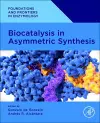
Biocatalysis in Asymmetric Synthesis
2 contributors - Paperback
£134.00
Prof. Gonzalo de Gonzalo is an Associate Professor at the Organic Chemistry Department of the Chemistry Faculty at the University of Seville, Spain. He obtained his Degree and his Ph.D. in Chemistry at the University of Oviedo, Spain. He spent his postdoctoral stage at Consiglio Nazionale delle Ricerche, Milan, Italy, moving back to University of Oviedo with a Juan de la Cierva Fellowship. In 2010, he spent one year at the University of Groningen, The Netherlands, working in the research of novel oxidative enzymes. He worked two years for the pharmaceutical company Antibióticos S.A.U. León, Spain, moving to Seville in 2014 as a Ramón y Cajal Researcher, getting his present position in 2019. His research is focused on asymmetric synthesis by using different approaches, including biocatalytic and organocatalytic procedures, as well as the development of concurrent chemo- and biocatalytic reactions. He has published more than 90 scientific papers, including two books focused on biocatalysis applied to the synthesis of valuable compounds. Prof. Andrés R. Alcántara is a Full Professor at the Department of Chemistry in Pharmaceutical Sciences of the Pharmacy Faculty at the Complutense University of Madrid, Spain. He obtained his Degree and his Ph. D. in Chemistry at the University of Córdoba (Spain). He spent his postdoctoral stage at the University of Kent Canterbury (UK), returning to the Complutense University where he was Associate Professor from 1993 until 2018, when he gained Full Professorship. His research has been focused on Biotransformations and Applied Biocatalysis in Organic Chemistry, more specifically, in the preparation of enantiomerically pure compounds as chemical drug precursors, using mainly proteases, lipases and alcohol dehydrogenases, either native or immobilized. On the other hand, his work fits perfectly within Sustainable Chemistry, since he has applied these biocatalysts mainly in sustainable bio-solvents, which generates a very beneficial synergy from the point of view of the sustainability of the processes. All this has led him to publish more than 130 scientific papers, reviews, monographs, book chapters, and more than 100 communications to national and international Congresses. He is a member of the Board of ESAB (European Society of Applied Biocatalysis) and ESAB delegate inside the Board of SusChem, the European Platform of Sustainable Chemistry.